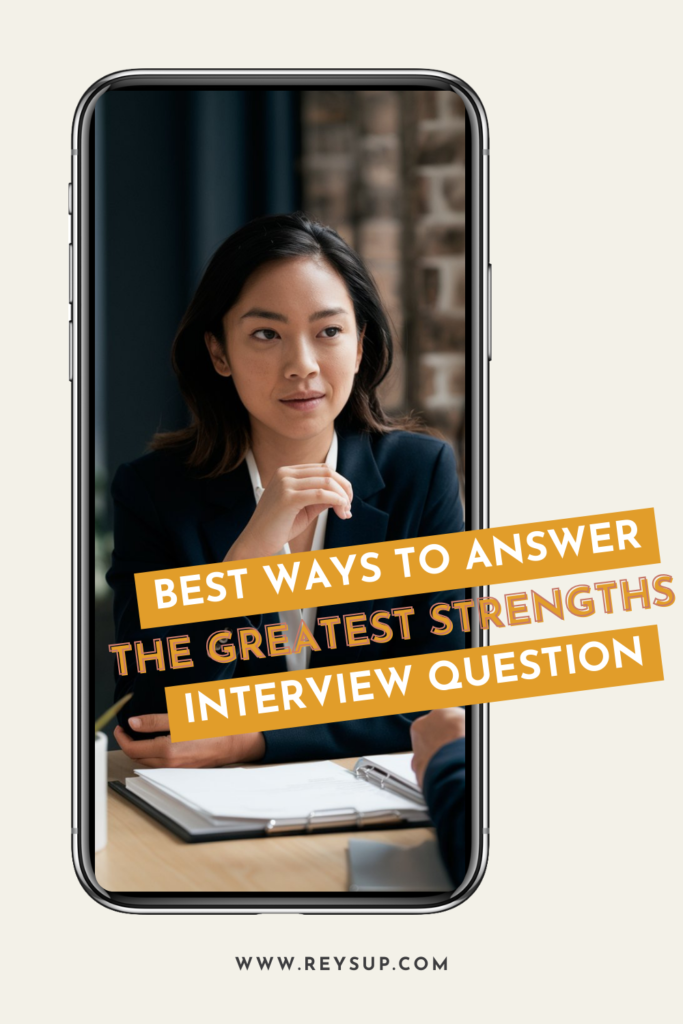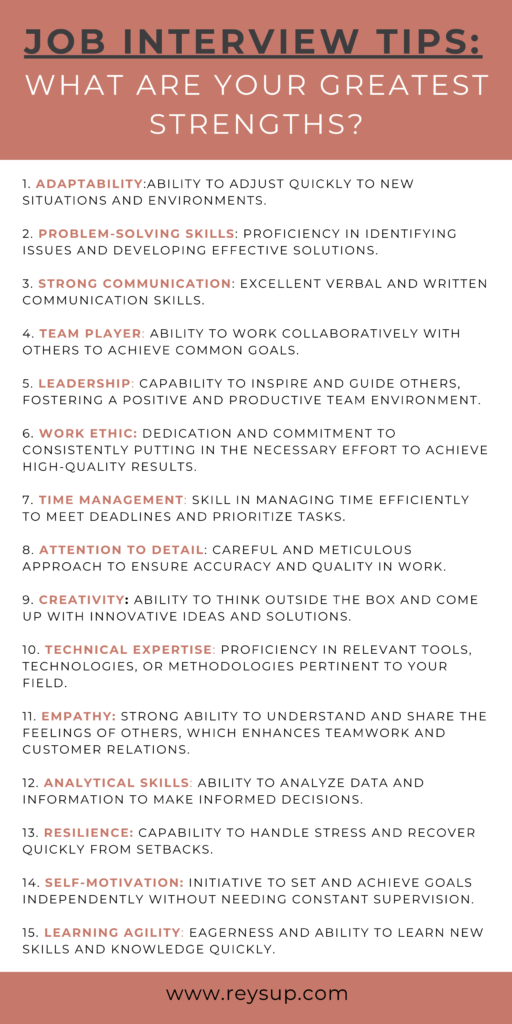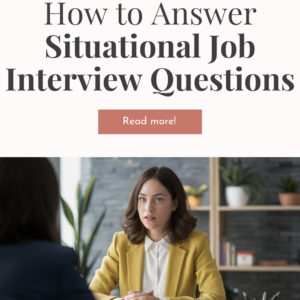In this article you will learn how to ace the Greatest Strengths Interview Question with tips, examples, and strategies to showcase your strengths and impress potential employers.
While not as scary as the “What is your biggest weakness” question, “what are your greatest strengths?” always used to throw me for a loop. The last thing anyone wants is to come off aggressive or intense – especially in an interview! This question, while seemingly straightforward, often trips up candidates – including myself. It’s a staple in interviews because it reveals so much about you to the hiring manager and the team. It allows interviewers to see you for you. It gives them visibility into your level of self-awareness, your confidence, and how well you understand the job you’re applying for. While it may have tripped you up in the past, by the end of this guide, you’ll be more than prepared to tackle this question with finesse.

Why Do Interviewers Ask About Your Greatest Strengths?
First things first, let’s talk about why interviewers ask this question. Understanding the “why” can help you better shape your “how”. Answering this question is a combination of an art and a science. Here is what your future employer want to get from this question.
- Are you self-aware?: Potential employers want to simply know if you are even aware of what you are good at. Believe it or not, I’ve seen a lot of candidates who don’t know what to say to this question or have to think about it. Showing up prepared with a well thought out answer speaks volumes, and highlights the fact that you understand who you are.
- Are you the right fit for this role?: This goes back to awareness. Have you done your research? Have you read the job description? When asking the greatest strengths question, employers want to know that your strengths are aligned to what is needed for the role.
- Do you have confidence in yourself and your abilities?: Your employers want to know that you don’t just believe in yourself, but can carry yourself in a way that can push things forward. Someone who exudes confidence in themself is likely to do the same at work and that leads to results!
How to Identify Your Greatest Strengths
Before you can talk about your strengths, you need to know what they are. Here are some steps to help you identify them:
- Reflect on Your Experiences: Think about times when you excelled at work or in other settings. What were you doing? What skills or traits helped you succeed?
- For example, I once had to lead a project with a closely approaching deadline. My organizational skills and ability to stay calm under pressure were a key part of what allowed us to me our goals. This reflection helped me identify that being organized and staying calm under pressure are two of my strengths.
- Seek Feedback: Sometimes it’s hard to see our own strengths. Ask colleagues, friends, or mentors what they think your strengths are. Their insights can be incredibly valuable.
- I remember asking a former manager for feedback, and she highlighted my problem-solving skills. I hadn’t realized how much I relied on this ability until she pointed it out, which made me more confident in discussing it during interviews.
- Align with the Job: Look at the job description and identify key skills and traits the employer is seeking. Think about how your strengths align with these requirements.
- When I was applying for an operations role, I noticed the job required strong analytical skills. I made sure to highlight my experience in data analysis and how it helped previous campaigns succeed.
Structuring Your Answer to the Greatest Strengths Interview Question
When answering the greatest strengths interview question, it’s helpful to structure your response. Here’s a simple formula to follow:
- State the Strength: Start with a clear and concise statement of your strength.
- Provide Evidence: Share a specific example that demonstrates this strength in action.
- Relate to the Role: Explain how this strength is relevant to the job you’re applying for.
Examples of Strong Answers to the Greatest Strengths Interview Question
Let’s look at some examples to see this formula in action.

Example 1: Strong Communication Skills
“One of my greatest strengths is my communication skills. In my previous role as a project manager, I was responsible for coordinating between different departments. By maintaining clear and consistent communication, I ensured that all team members were aligned on project goals and deadlines. This not only improved efficiency but also fostered a collaborative work environment. I believe this strength will be particularly valuable in your organization, where cross-functional teamwork is essential.”
Example 2: Problem-Solving Abilities
“I consider my problem-solving abilities to be one of my greatest strengths. In my last job as a software engineer, I faced a critical issue where our system was repeatedly crashing due to a bug. I took the initiative to lead a team to diagnose and resolve the issue, ultimately developing a more robust code review process. This not only fixed the immediate problem but also prevented similar issues in the future. I’m confident that my proactive approach to problem-solving will contribute positively to your development team.”
Example 3: Leadership Skills
“My greatest strength is my leadership ability. As a sales team leader at my previous company, I successfully managed a team of 15 sales representatives. By implementing regular training sessions and one-on-one coaching, I helped improve their performance, leading to a 20% increase in sales within six months. I’m excited about the opportunity to bring my leadership skills to your team and drive similar success.”
Also Read The Best Finance Books to Read in Your 20s
Common Mistakes to Avoid
While it’s important to know what to do, it’s equally important to know what to avoid. Here are some common mistakes to watch out for:
- Being Too Vague: Avoid generic statements without specific examples. Saying “I’m a good communicator” isn’t enough—you need to back it up with evidence.
- Overconfidence: Confidence is good, but overconfidence can be off-putting. Balance your answer with humility.
- Irrelevant Strengths: Ensure your strengths are relevant to the job you’re applying for. Highlighting a strength that doesn’t align with the job requirements won’t help your case.
The Importance of Self-Awareness
Self-awareness isn’t just about knowing your strengths; it’s about understanding how they fit into the bigger picture. It involves recognizing how your strengths can contribute to the team and the company. This level of insight shows employers that you’re not just focused on your own success but also on the success of those around you.
Tailoring Your Answer to Different Jobs
Different jobs require different strengths. A strength that’s crucial for a project manager might not be as important for a software engineer. When preparing your answer, think about the specific skills and traits that are most relevant to the job you’re applying for.
For Example:
- Project Manager: Strong organizational skills, effective communication, ability to manage multiple tasks.
- Software Engineer: Problem-solving abilities, attention to detail, proficiency in specific programming languages.
- Sales Representative: Persuasive communication, resilience, ability to build relationships.
By tailoring your answer to the specific job, you show the employer that you’ve done your homework and that you’re a good fit for the role.
- When I was transitioning from a consulting role to an operations position, I emphasized my ability to bridge communication between technical and non-technical teams, a crucial strength for the new role.
Practicing Your Answer to the Greatest Strengths Interview Question
Practice makes perfect. The more you practice your answer, the more comfortable you’ll feel delivering it during the interview. Here are a few ways to practice:
- Rehearse in Front of a Mirror: This can help you see your body language and facial expressions.
- Record Yourself: Listening to a recording of your answer can help you identify areas for improvement.
- Mock Interviews: Practice with a friend or mentor who can give you feedback.
I personally have found mock interviews particularly helpful. A friend played the role of the interviewer and gave me constructive feedback, which significantly improved my confidence and delivery.
Staying Flexible
While it’s important to prepare your answer to the greatest strengths interview question, it’s also important to stay flexible. Interviews can be unpredictable, and you may need to adjust your response on the fly. Be prepared to think on your feet and adapt your answer based on the flow of the conversation.
Leveraging Your Strengths Beyond the Interview
Understanding and articulating your strengths isn’t just useful for interviews—it’s a valuable skill for your overall career development. Knowing your strengths can help you seek out opportunities that align with your abilities and passions, leading to greater job satisfaction and career success.
After recognizing my strength in mentorship, I sought out opportunities to mentor junior colleagues, which not only benefited them but also enhanced my own leadership skills and job satisfaction.
Conclusion
Mastering the greatest strengths interview question takes self-awareness, thoughtful reflection, and strategic alignment with the job at hand. By articulating your strengths effectively, you can showcase your value to potential employers and increase your chances of landing the job. Remember to be specific, confident, and relevant in your response, and you’ll leave a lasting impression.
In summary, the key to answering the greatest strengths interview question lies in understanding the purpose behind it, identifying your strengths, and structuring your response effectively. Practice your answer, stay flexible, and most importantly, be genuine. With these tips in mind, you’ll be well on your way to acing your next interview.
So next time you’re faced with the “greatest strengths” question, you won’t need to worry. You’ll be ready to deliver a thoughtful, well-articulated answer that highlights your unique strengths and demonstrates why you’re the perfect fit for the job.
If you are looking for more common interview questions, you can visit this section of our blog.
Happy interviewing!




